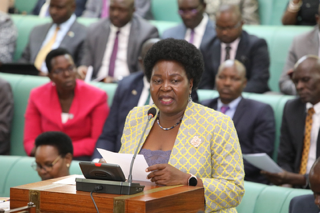The Minister of Energy, Minerals and Mineral Development, Ruth Nankabirwa, on Tuesday tabled before Parliament the Petroleum Supply (Amendment) Bill, 2023, that seeks to grant Uganda National Oil Company (UNOC) monopoly to supply imported petroleum products.
Minister Nankabirwa told Parliament that the move is aimed at enhancing supply security, reducing pump prices, and generating additional revenue for UNOC to support infrastructure development, especially in the oil sector.
“The Petroleum Supply Act, 2003 does not empower the UNOC to supply all imports to the licensed oil marketing companies of petroleum products for the Ugandan market. This gap in the Act has threatened the security of supply of petroleum products in Uganda,” she said.
“The gap in the Act has exposed Uganda to occasional vulnerability to access the committed demand volumes of petroleum products, leading to petroleum product shortages and abrupt increase in retail pump prices,” she added.
Under the proposed arrangement, UNOC will exclusively source petroleum products from Vitol, a Swiss-based Dutch global energy and commodities giant. The duo signed a supply contract in August which was later ratified by Cabinet last week.
Uganda National Oil Company recently negotiated a five-year contract with Vitol Bahrain E.C.
The Ministry of Energy’s statement said Vitol Bahrain E.C will be financing the business by providing a working capital facility backed by its global balance sheet and working with UNOC to ensure competitive pricing of petroleum products.
Vitol Bahrain E.C. reportedly committed to financing the construction of additional capacity in partnership with UNOC of 320 million litres at Namwambula, Mpigi.
The ministry insisted that Oil Marketing Companies (OMCs) will continue selling the products to consumers through their commercial arrangements and the retail fuel pumps.
Nankabirwa in a press statement on Tuesday said the government believes that supporting UNOC will enhance its competitiveness on the international stage and benefit the people of Uganda.
The minister said the Government of Uganda has decided to enhance its involvement in ensuring the security of the supply of petroleum products into the Country by mandating the Uganda National Oil Company Limited (UNOC) to source and supply the petroleum products to the licensed Oil Marketing Companies actively involved in the importation of the products for Uganda.
By assigning UNOC the responsibility of importing petroleum products, the bill intends to reduce reliance on external suppliers, streamline the importation process, eliminate unnecessary transactions in the supply chain, and ultimately make petroleum products more affordable for consumers.
The government also hopes that UNOC’s involvement in the importation supply chain will generate additional revenue to finance other infrastructure projects that UNOC has a vested interest in on behalf of the State. The amendment also seeks to authorize the Minister of Energy with the approval of the Cabinet, to nominate any other person to import petroleum products for the Ugandan market.
It is hoped that the proposed changes will improve the security of the supply of petroleum products for the Country. Uganda has on many occasions faced severe fuel shortages leading to a hike in prices. So the government is of the view that the change in the law and policy will contribute to the reduction of the pump prices by eliminating unwarranted transactions in the supply chain.
Uganda is currently a net importer of petroleum products, where more than 90% are imported through the Mombasa port in Kenya and the rest through the Dar-es-Salaam port in Tanzania.
The importation is done independently by the licensed Ugandan Oil Marketing Companies (OMCs) through the importation structures in Kenya and Tanzania.
Under the existing importation structures, the Ugandan Oil Marketing Companies have been accessing their petroleum products import allocations through their affiliated Kenyan Oil Marketing Companies registered and participating in Kenyan and Tanzanian import structures.
In April 2023, the Government of Kenya made changes to the petroleum products import system by replacing the Open Tender System with the Government-to-Government importation arrangement with the Governments of the United Arab Emirates and the Kingdom of Saudi Arabia to manage some of the importation challenges that Kenya was facing.
According to Nankabirwa, despite the price-competitive nature of the Open Tender System in Kenya and its relatively normal supplies, it exposed Uganda to occasional supply vulnerabilities where the Ugandan Oil Marketing Companies were considered secondary whenever there were supply disruptions.
“These vulnerabilities posed additional challenges, resulting in Uganda receiving relatively costly products and ultimately impacting the retail pump prices” said Nankbirwa.
She explained that with the amendment of the Petroleum Supply Act, the Ministry of Energy and Mineral Development shall maintain its overall responsibility of regulating the importation of petroleum products into Uganda.
Under the proposed arrangement, the Uganda National Oil Company (UNOC) will be responsible for sourcing and supplying petroleum products to the licensed Oil Marketing Companies (OMCs) involved in importing the products to Uganda.





